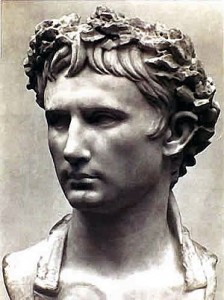Rhetoric: the Power of Identification
Caesar Augustus after the turmoil of the fall of the Republic and the establishment of the Empire found many Roman citizens and subjects spread throughout the Empire had become remote from original Roman ideals and values of the Republic. They no longer held the same level of identification. Augustus, on the advice of his wife, Livia, sought, not a political or social solution but surprisingly a religious one.
Augustus created two new divinities namely the Goddess Roma, who represented the female soul of the Roman Empire, and the Demi-god, Julius, the warlike hero who was Julius Caesar in apotheosis (divine honors had been offered to Julius Caesar in the East, while he was still alive; that he did not refuse them was one of the reasons why he was assassinated). Augustus knew the value of the religious bond to unite the province with Rome, a bond far stronger than one based on fear or gratitude. Roma and Julius were to be worshipped by such provincials as were Roman citizens (non-citizen were not allowed to worship these gods) and wished to be reminded of their national heritage. Then Maecenas, Augustus’s minister, proposed that his gap should be filled by the creation of another for the non-citizens. He proposed Augustus himself as it was an established custom among Orientals, and one which might well be turned to Rome’s profit, to pay divine honors to their rulers; but since it was clearly impractical for Eastern cities to worship the whole Senate (600 strong), one way out of this difficulty was to worship the Senate’s chief executive officer, who happened to be Augustus himself. So the senator feeling complimented that he was being worshipped (each senator 1/600 part of the god) agreed and shrines to Augustus were immediately erected throughout Asia Minor. The cult spread throughout the Eastern Empire but not in Rome itself or in the neighboring provinces.
(“I Claudius” P.30-31)


